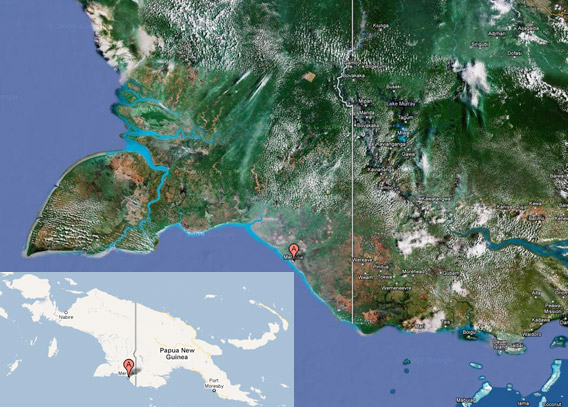Indonesia will target its last frontier — its territory on New Guinea — as it seeks to become a major agricultural exporter, reports the AFP.
In its quest to become one of the largest producers of rice, maize, sugar, coffee, shrimp, meats and palm oil, Indonesia will push development in the country’s largest remaining “wild” area: Papua, the Indonesian-held half of New Guinea.
Expansion in Papua will begin in a 1.6 million hectare (4 million acre) area around the town of Merauke, on the southern coast of New Guinea near the border with the independent country of Papua New Guinea. The forests around Merauke will be targeted for oil palm plantations and other large-scale agriculture, creating thousands of industrial jobs and spurring a population boom, according to an Indonesian government official.
“We chose Merauke because it’s the ideal place for food crop cultivation, such as rice, corn, soybean and sugar cane. Merauke district has 4.5 million hectares of land; 2.5 million hectares are ideal for cultivation,” Hilman Manan of the agricultural ministry told the AFP.
“The area is flat and has a good climate. Its soil is appropriate for those crops. Sumatra is already congested with other plantations, such as palm oil, and Kalimantan is already full of mining areas and many plantation areas also.”
Manan said the plan could more than quadruple Merauke’s population of 175,000 and trigger massive foreign investment in an otherwise “underdeveloped” region. Foreign entities would be allowed to own up to 49 percent of enterprises and would be offered “incentives like tax breaks and reductions in customs and excise duties.” Investors from Japan, South Korea and the Middle East are said to be interested.

Merauke. Image courtesy of Google Earth
But the plan faces opposition from environmentalists and small-scale farmers dependent on forests for a sustainable source of incomes. Locals fear the influx of industrial plantations could jeopardize their traditional livelihoods while offering few employment opportunities, since plantations workers are typically imported from other areas.
“We reject the concept of the food estate. For us, food estates are another kind of land grabbing scheme. It’s like going back to the era of feudalism,” Indonesian Farmers Union official Kartini Samon told the AFP.
“The regular farmers’ land will be taken by big companies and the farmers will be left with nothing.”
The scheme could also hurt efforts to develop projects under the proposed Reducing Emissions from Deforestation and Degradation (REDD) mechanism. Papuan Provincial Governor Barnabas Suebu has been a strong supporter of REDD in international discussions.
Jerome Rivet. Indonesia aims to be world’s breadbasket. AFP, Feb 21, 2010
Related articles